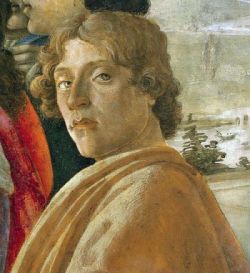
Sandro Botticelli
Sandro Botticelli
 Alessandro di Mariano di Vanni Filipepi (c. 1445[1] – May 17, 1510), known as Sandro Botticelli, was an Italian painter of the Early Renaissance. He belonged to the Florentine School under the patronage of Lorenzo de' Medici, a movement that Giorgio Vasari would characterize less than a hundred years later in his Vita of Botticelli as a "golden age". Botticelli's posthumous reputation suffered until the late 19th century; since then, his work has been seen to represent the linear grace of Early Renaissance painting.
Alessandro di Mariano di Vanni Filipepi (c. 1445[1] – May 17, 1510), known as Sandro Botticelli, was an Italian painter of the Early Renaissance. He belonged to the Florentine School under the patronage of Lorenzo de' Medici, a movement that Giorgio Vasari would characterize less than a hundred years later in his Vita of Botticelli as a "golden age". Botticelli's posthumous reputation suffered until the late 19th century; since then, his work has been seen to represent the linear grace of Early Renaissance painting.
As well as the small number of mythological subjects which are his best known works today, he painted a wide range of religious subjects and also some portraits. He and his workshop were especially known for their Madonna and Childs, many in the round tondo shape. Botticelli's best-known works are The Birth of Venus and Primavera, both in the Uffizi in Florence. He lived all his life in the same neighbourhood of Florence, with probably his only significant time elsewhere the months he spent painting in Pisa in 1474 and the Sistine Chapel in Rome in 1481–82.
Only one of his paintings is dated, though others can be dated from other records with varying degrees of certainty, and the development of his style traced with confidence. He was an independent master for all the 1470s, growing in mastery and reputation, and the 1480s were his most successful decade, when all his large mythological paintings were done, and many of his best Madonnas. By the 1490s his style became more personal and to some extent mannered, and he could be seen as moving in a direction opposite to that of Leonardo da Vinci (seven years his junior) and a new generation of painters creating the High Renaissance style as Botticelli returned in some ways to the Gothic style.
He has been described as "an outsider in the mainstream of Italian painting", who had a limited interest in many of the developments most associated with Quattrocento painting, such as the realistic depiction of human anatomy, perspective, and landscape, and the use of direct borrowings from classical art. His training enabled him to represent all these aspects of painting, without adopting or contributing to their development.
Taken from Wikipedia